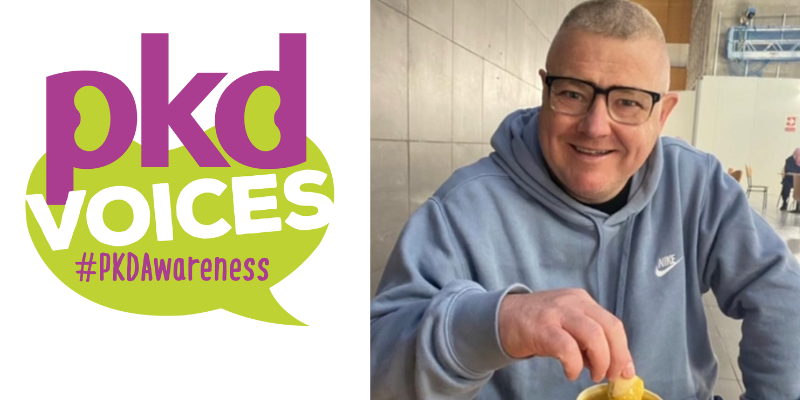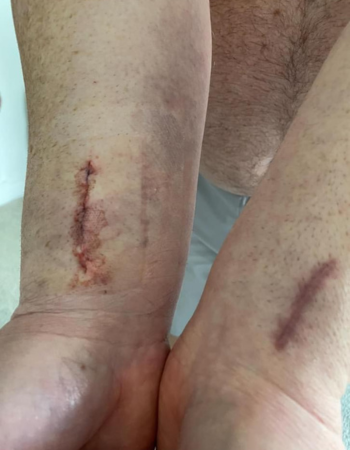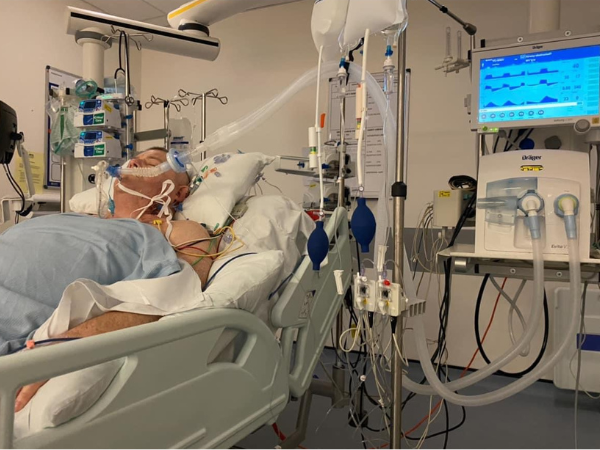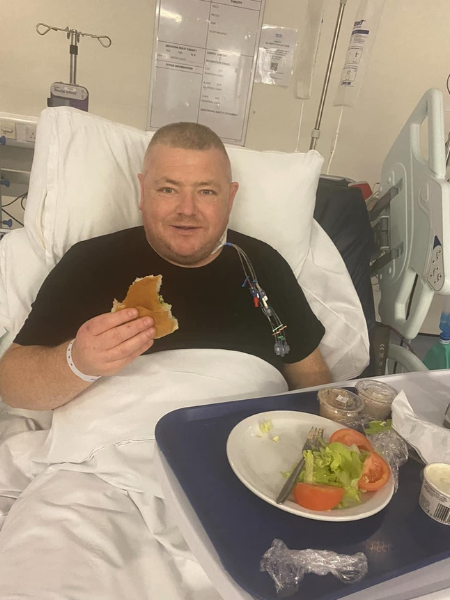
Stephen's Story
I am Stephen Adams, 45, from Glasgow, Scotland. I am married to Jennifer and we have 3 children: Matthew, Chloe and Joshua. My occupation is in software for a UK customer engagement software company. Seven years ago, during a routine examination after moving house and changing GPs, I received the unexpected news: I had Polycystic Kidney Disease (PKD).
The discovery came as a shock, particularly considering my mother’s untimely death at 47 from Calciphylaxis, a rare and severe condition characterised by calcium buildup in blood vessels. PKD, an inherited disorder, causes clusters of cysts to develop within the kidneys, gradually enlarging them and impairing their function over time. Unlike the swift progression of Calciphylaxis, PKD tends to manifest as a slower deterioration, allowing individuals to lead relatively normal lives for years.
Initially, I attended Renal Clinics every six months, where my health was monitored closely. Over the years, these appointments became more frequent, eventually leading to monthly visits. The nephrologists were clear: a transplant was the ultimate goal as there is no cure for kidney failure.
Despite this, I maintained a semblance of normalcy in my life, engaging in family activities, work, holidays, and sports.

Fistula surgery left its mark
Fast forward to October 2022, I received an unexpected call from the Renal Department of one of the hospitals in Glasgow, summoning me to meet a surgeon urgently. During that meeting, the surgeon discussed PKD and what it meant – which I already knew by then – and he said: “You need a transplant”, to which I replied: “Yes, I know”. The consultant then followed up with “You need a transplant now. Do you have a donor?”.
What followed was a stark revelation: despite my outwardly normal life, my condition had worsened significantly. I had been in denial all these years. Further examinations revealed the need for a nephrectomy to make space for the new kidney. Surgery preparations included discussions about potential dialysis, a prospect that became a reality post-operation. The first operation for the insertion of a fistula for blood access in my left arm did not work, so they tried again in my right arm and this time round they were successful.
On May 31, 2023, I had a nephrectomy through a huge insertion across my stomach and delivered an 8lb Kidney! In the following couple of days, I took a turn for the worse and ended up having to get dialysis. They had tried to use my right arm fistula, but the vein had burst due to it being so deep and ended up with an emergency neckline and then a chest line.
Amidst the chaos, I had two people offering to donate a kidney, both of whom were compatible: my wife and a friend of +20 years. At first, my wife seemed to be a better match, but she failed one of the kidney tests four or five months into the process. Therefore, my friend was approached instead, and after rigorous testing, he emerged as a viable candidate.
I was discharged from the hospital in July but required dialysis three times per week. This was not an issue because I knew it was only short-term until the surgery, which I was told was going to take place in August. However, as August approached, communication between the coordinators and myself had become poor and non-informative with things like “Do not call us, we will call you”, which I found very frustrating.
In the meantime, I was trying to have a full-time job, and this took a toll on my mental health. Dialysis was torture and boring, but necessary, and I found myself “crashing” on the machine often which is your body’s way of shutting down.
Finally, at the beginning of November 2023, the long-awaited transplant date arrived: November 29. What happened next is a little bit of a blur to me I went into the hospital for final checks on Tuesday 28th and that evening was a flurry of activity and was made to feel like a rockstar with all the individual medical teams wanting to introduce themselves and have a chat/explain what to expect from that team then the nurse came round with toast and tea (why is hospital toast the best???).
The following day, I greeted my donor, who arrived bright and early at 7 am. We shared a heartfelt embrace, expressing my gratitude once again and exchanging well wishes. Shortly thereafter, I was summoned to the theatre around lunchtime. I vividly recall the reassuring words of the anaesthetist whom I had met the previous night. With a comforting demeanour, she assured me, "I will not leave your side, and we will take care of you. Now, take a big, deep breath."

Stephen in ICU
Initially, the transplant procedure seemed to have gone to plan. However, as the night progressed, an unexpected issue arose—a twist of fate that defied belief. Subsequently, I underwent three major surgeries over the next three days, accompanied by five blood transfusions and a period spent in an induced coma within the confines of the Intensive Care Unit (ICU). The care I received while I was "out of the game," as it were, is something that stirs deep emotions within me. I've been told of the remarkable efforts made on my behalf—a dedicated team of professionals, comprising various specialities, crowded into my cubicle, each playing a vital role in my care.
From those working tirelessly to keep me alive to others offering small comforts like moistening my lips, their collective dedication is a testament to the compassion and expertise that permeates every corner of the medical profession. Upon regaining consciousness and learning of the events that transpired, I found myself overwhelmed with emotions—a rarity for a 45-year-old Glaswegian man. It was a tumultuous mix of feelings, from grappling with the gravity of what had occurred to grappling with the impact my ordeal had on my wife and children.
Over the subsequent week, I remained under vigilant observation—a nurse by my side around the clock until I regained enough strength to be transferred to the kidney ward. However, the road to recovery was far from smooth sailing. Shortly after my discharge, I faced setbacks; within 24 hours, severe diarrhoea, induced by one of the medications, prompted my readmission. Subsequently, I developed an infection in my wound, necessitating drainage and treatment with intravenous antibiotics. While these were undoubtedly challenges on my journey, they were mere bumps in the road.

On the road to recovery!
Fast forward to the present, and I am back at work, embracing life with renewed vigour. I've embarked on rejuvenating holidays in Poland and Malta, with more adventures planned for the coming months. Weekends are spent dining out with my wife, relishing in the simple joys of life. In fact, I haven't felt this good in 10 years.
My donor returned to work approximately 6 to 8 weeks after surgery, and he nonchalantly remarked, "It was a breeze" :) However, having undergone kidney removal myself, I know firsthand that it's anything but. Nonetheless, he is thriving, and I couldn't be more grateful. He has taken it upon himself to share his journey with prospective donors, highlighting both the positives and negatives of being a donor. His selflessness knows no bounds; throughout the entire process, he has been an unwavering source of support for me and my family.
Just 12 hours after his surgery, he sat by my bedside during the night in the ICU, praying with me (obviously I didn't take part). Remarkably, he discharged himself from the hospital at record speed, all so other patients could benefit from the hospital bed. Truly, he is an extraordinary individual and a pillar of strength during this journey.
Finally, as someone who has navigated the profound challenges of a life-altering medical journey, I've garnered invaluable insights. Here are some tips I'd like to share:
- For policymakers, government officials, and health services: improvements need to be made. I suggest enhancing the dialysis experience by introducing educational courses, incorporating live music or entertainment, fostering nurse-patient engagement, and diversifying activities to make dialysis sessions more engaging and uplifting. People don't choose a life of Kidney disease, therefore make it the best it can be.
- To dialysis patients: Stay resilient and maintain a positive outlook; your perseverance will be rewarded in due time. I am committed to advocating for improvements in the dialysis experience and raising awareness about our condition.
- For those who have undergone transplantation: Seize each moment and live life to the fullest. We are the fortunate ones, and it's essential to cherish every opportunity. Let's actively educate others about kidney disease and share our experiences to inspire and inform. Kidney diseases should be spoken about and funded in line with other major illnesses and it's our job to bang that drum.
Stay up to date with PKD Charity events, patient stories and research news as it happens.
